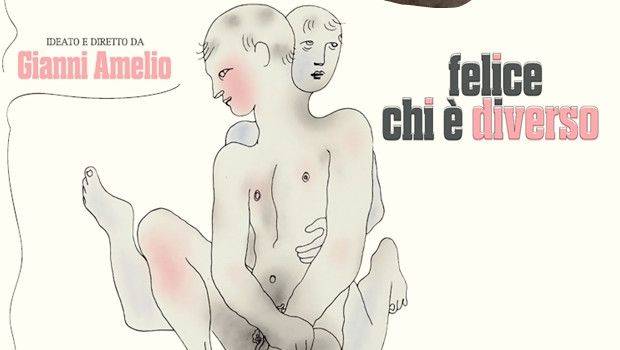Italy in Retrograde
Happy to be Different (Beato chi è diverso)
Directed and Written by Gianni Amelio
Distributed by Luce/Cinecittà
Open Roads: New Italian Cinema: 2014, June 5-12
Film Society of Lincoln Center
When it comes to gay rights, it is no secret that Italy lags behind the rest of Europe, North America, and even ultra-Catholic Latin American nations. The most modest initiatives to counter discrimination and guarantee rights face concerted, often hysterical opposition from the Catholic Church and its allies on both the right and the left. Violent attacks on gay males, lesbians, and transgender people are common and cultural stigma is widespread and deeply rooted.
When I heard that the film director Gianni Amelio was making a documentary about gay male life in Italy, from the Fascist era to the present, I had high hopes that this prominent, respected, and talented artist – whose films Lamerica and Il ladro di bambini I greatly admired – would bring to the subject his usual insight and critical intelligence. Instead, Happy to be Different (Beato chi è diverso) is a near-total failure. Rather than a breakthrough, Amelio's film is yet another example of how retrograde Italy can be when it comes to homosexuality. How disappointing that it comes from one of Italy's few openly gay filmmakers; Amelio came out last year, at age 68, although his sexuality had been an open secret in gay and film circles for years.
The documentary, which takes its title from a poem by Sandro Penna, comprises personal testimonies by eighteen gay men and one transsexual. Amelio's subjects are filmed mostly in close-up or medium-long shots, speaking directly to the camera; the narratives are interspersed with photographs, newsreels, and clips from TV shows and films. The men speak about their experiences of being "different," and predictably, most of their accounts are sad and depressing, even tragic. One recalls how his violent, virulently homophobic father tied him to a horse for two days and nights as punishment for his sexuality. It's clear that most of Amelio's interviewees were deeply wounded by their experiences, and remain so.
That is about all Happy to Be Different has to say – it's hard being gay in Italy. You can't help wondering, for whom did Amelio make this banal and superficial film? Liberal Italian heterosexuals? Italian gays? For the former, Happy might flatter their sensibilities – oh, isn't it awful, that terrible father tying his son to a horse. They can leave the screening room content in the knowledge that they wouldn't abuse their gay son or lesbian daughter, if they had one. For the latter, nothing that it has to say would be new or informative. And for audiences of any nationality or sexuality who are used to well-crafted and challenging gay documentaries – The Life and Times of Harvey Milk, Before Stonewall, Paris is Burning, How To Survive a Plague, to cite just a few – Amelio's film will be very weak tea indeed.
Several themes are introduced and recur, although none is sufficiently developed: familial and societal homophobia, homosexuality as gender nonconformity, sex, and relationships. An older couple – two of the film's most engaging subjects – talk about the joys of their long-term relationship; another man, who calls himself "frivolous," exults in promiscuity and decries relationships as "boring." One man says he always wanted a family, so he found a lesbian to marry.
But what struggles did the happy couple experience? How have they dealt with the issues – social, economic, and sexual – that long-term male spouses often face? What do they think about the current status of gay Italians? The film never tells us.
And the man who married the lesbian – did they have children? How have they managed to stay together? What do their friends, families, and larger community think about their arrangement? We never find out. Instead, we get an irrelevant and puzzling comment from the lesbian wife about a civic monument to a "frocio."
Maddeningly, the film doesn't identify the interviewees until the closing credits. So until then, we don't know their names, their ages, or, except when they tell us, where they live.
If the film glosses over regional differences, its treatment of class is just as shallow. The opening sequence depicts a distraught woman, in a hospital bed, listening to a male voice explaining that her son's sexuality will cause her great grief because she lives in a working class community. Had she come from an aristocratic milieu, things would be much easier for her. Later, one of the interviewees speaks of the middle class fear of scandal. So, the upper class either is tolerant or unconcerned, the middle class repressed and uptight, and the working class bigoted.
Yet we encounter several men from working class backgrounds whose families did not reject them, including Ninetto Davoli, a Calabrian who, as a teenager, became the muse and lover of Pier Paolo Pasolini. Speaking of Pasolini, one of the most glaring failures of Amelio's film is its treatment of the great director, poet, and social critic. Italy's gutter press, the political Right, and the Catholic Church were absolutely vicious toward one of the nation's most important cultural figures, and the film shows us that. But it never provides a sense of Pasolini's stature as an artist and gadfly, or of his contradictions. Moreover, Amelio skims over Pasolini's murder – and doesn't even acknowledge the unsolved mysteries surrounding its circumstances -- showing us only an image of the murder weapon and of Pasolini's covered corpse. It's shocking that a filmmaker of Amelio's stature – and a gay one with leftist politics – could botch this topic so badly.
You'd hardly guess from the film that Italian gays have organized to fight the conditions that oppress them, yet Italy has had a gay movement since the 1970s. (Fuori, founded in 1971, was Italy's first liberationist organization.) One man mentions having known Mario Mieli, an influential theorist and activist during the movement's early years. But unless you know the historical context – and how many viewers will? – The reference is meaningless.
But perhaps the most infuriating thing about Happy to Be Different is its failure to address the role of the Catholic Church and the Vatican in promoting homophobia and oppressing sexual and gender minorities. This is inexcusable, given the Vatican's relentless anti-gay politicking, and that Italy's family-centric and masculinist culture is rooted in Catholic ideology, whose precepts even some on the left (the so-called theodems or catti-communists) uphold.
Happy to Be Different may not be the worst film in this year's edition of Open Roads. But I can't imagine a bigger disappointment, or greater missed opportunity.





































i-Italy
Facebook
Google+
This work may not be reproduced, in whole or in part, without prior written permission.
Questo lavoro non può essere riprodotto, in tutto o in parte, senza permesso scritto.